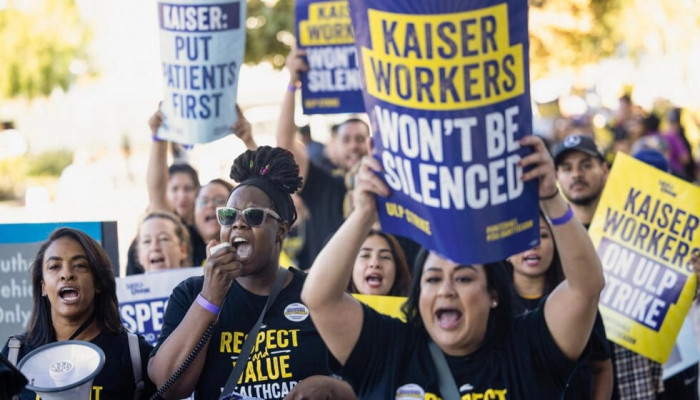US healthcare crisis: Over 75,000 Kaiser Permanente employees commence strike
- In Reports
- 11:24 AM, Oct 05, 2023
- Myind Staff
Over 75,000 employees of Kaiser Permanente commenced a strike driven by allegations of unfair labour practices within the healthcare system. This strike unfolded in several regions, with workers in Virginia and Washington, D.C., initiating their walkout at 6 a.m. ET. Simultaneously, employees in California, Colorado, Washington, and Oregon joined the strike at 9 a.m. ET. The collective action is heralded as the most extensive healthcare workers' strike in U.S. history, as reported by the unions.
Workers in the Mid-Atlantic States have planned a one-day strike, while their counterparts in Western states intend to strike for three days. The strike is a response to grievances related to labour practices within Kaiser Permanente, illustrating the ongoing labor tensions within the healthcare industry.
The strike encompasses a broad spectrum of positions within Kaiser Permanente, encompassing roles such as nurses, emergency department technicians, pharmacists, optometrists, home health aides, medical assistants, dental assistants, and various others.
The Coalition of Kaiser Permanente Unions, a representative body for more than 85,000 workers, has raised concerns about Kaiser's current staffing crisis. They argue that insufficient staffing levels can lead to extensive wait times for patients, inadequate care, and potentially missed diagnoses. These concerns underscore the critical issues related to labor practices within the healthcare system, prompting this significant strike action by healthcare workers.
Furthermore, the Coalition is pushing for improved healthcare plans for retirees and safeguards against outsourcing and subcontracting of work.
"Both Kaiser Permanente management and Coalition union representatives are still at the bargaining table, having worked through the night in an effort to reach an agreement," the statement read. "There has been a lot of progress, with agreements reached on several specific proposals late Tuesday."
The statement continued, "We remain committed to reaching a new agreement that continues to provide our employees with market-leading wages, excellent benefits, generous retirement income plans, and valuable professional development opportunities."
Kaiser announced that negotiations had not concluded with a final agreement. However, the company stated in a press release that both parties had reached certain "preliminary agreements" aimed at addressing the issues raised by union members. These agreements include universal wage increases, updates to the performance-sharing plan, the establishment of a $25 minimum wage in California and $23 outside the state, improvements in health and retirement benefits, and the renewal of the company's tuition assistance and training programs.
"We will coordinate with Coalition leaders to reconvene bargaining as soon as possible. We will work hard to reach an agreement so that together, we can all return to delivering on the mission of Kaiser Permanente for the benefit of our members, patients, employees, physicians, customers, and communities," read the company's statement.
No new discussions have been scheduled, as indicated in a statement from Caroline Lucas, the spokesperson for the Coalition of Kaiser Permanente Unions.
Her statement read, “Frontline healthcare workers are awaiting a meaningful response from Kaiser executives regarding some of our key priorities including safe staffing, outsourcing protections for incumbent healthcare workers, and fair wages to reduce turnover. Healthcare workers within the coalition remain ready to meet at any time. Currently, the strike continues, and there are no sessions scheduled at this hour."
The Kaiser strike coincides with significant labour actions occurring in various sectors. On September 15, the United Auto Workers initiated a strike against General Motors, Ford, and Stellantis following failed contract negotiations with these automakers.
Furthermore, the Screen Actors Guild-American Federation of Television and Radio Artists (SAG-AFTRA) is continuing its strike against the Alliance of Motion Picture and Television Producers (AMPTP), which commenced on July 14.
Earlier, the Writers Guild of America concluded its nearly 150-day strike against AMPTP, successfully securing improved compensation and regulations for the use of artificial intelligence in specific projects.
Image source: Reuters







Comments